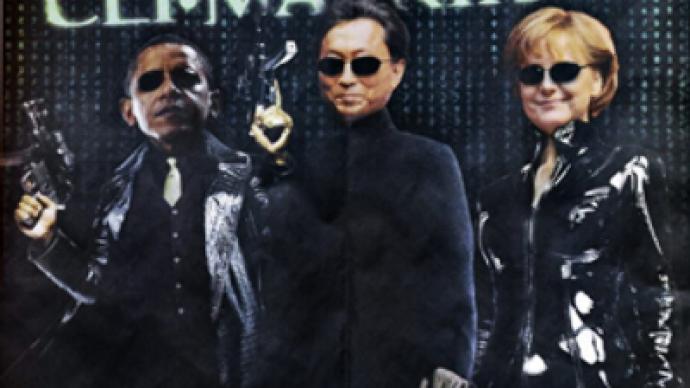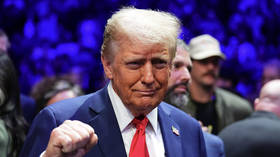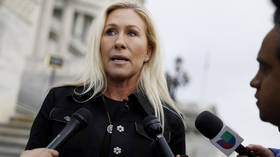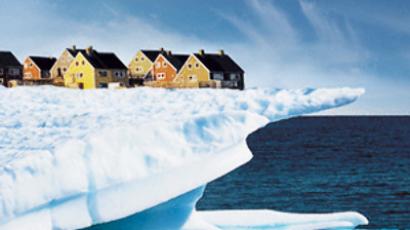Political theater warms up Copenhagen climate summit

As the UN climate change conference enters its second week, delegates are trying to reduce the heat between representatives of the developed and developing economies, as well as the protesters.
Negotiators in Copenhagen are trying to make some progress in their talks before world leaders, including US President Barack Obama and Russia’s Dmitry Medvedev, arrive at the end of the week. But the delegates remain stuck on a different sort of green issue: money.
The Catch-22 of the raging climate change debate is that, although everybody seems committed to playing their part in stabilizing global temperatures, no nation is willing to jeopardize the condition of their economy to do it.
The controversy over the “reality” of global warming is not being heard in Copenhagen; indeed, most of the delegates assembled in the Danish capital – despite freezing temperatures – seem genuinely convinced that the threat of climate change is not bad science fiction. For negotiators, the million-dollar question is: who will foot the monstrous bill to cut greenhouse gas emissions and spark green technologies?
On Friday, delegates presented a draft treaty that committed the developed "rich" nations to slashing their carbon emissions from 1990 levels by 25 to 45 per cent over the next decade. As for developing "poor" economies, such as China, India and Brazil (which were excluded from the 1997 Kyoto Protocol, which led to the United States’ unpopular decision not to ratify the treaty) would reduce their noxious output by 15 to 30 percent.
But Friday's draft agreement failed to specify how much money the rich countries would give the poorer ones to deal with the effects of global warming. The oversight triggered a temporary setback for the summit.
China, India and other developing nations boycotted the talks on Monday, bringing the negotiations to a screaming halt. Representatives for the developing nations demanded that the developed countries agree to deeper cuts in their greenhouse gas emissions, as well as commit to promises on financial aid.
Representatives from the developing countries, made up of 135 nations, said they refused to participate in any formal working groups at the 192-nation summit until the issue was resolved.
The poor countries need a hefty infusion of financial assistance to "go green," but they are requesting funds at a bad time: with the financial crisis headache still lingering, the rich countries and their hobbling corporations are wondering if it is the best time to experiment with green technologies. Others argue it is the perfect way to jumpstart the global economy back to life.
So the developed countries played it safe, promising $10 billion a year for three years, with more funds to follow. But other methods for “footing the climate bill” – like paying poorer countries to protect their forests – have also been forwarded.
The idea is to pay some developing countries – like Brazil, for example, whose Amazon rain forest has been called the “lungs of the planet” – not to cut down trees, which serve as vast carbon collectors, while emitting precious oxygen. Those tempting options are now on the table in Copenhagen.
In his latest video blog, Russian President Dmitry Medvedev urged the major emitters of global gases – Russia included – to work together to tackle climate change.
“Russia believes that such cooperation is vital," the Russian president said. “The major economies of the world, and hence the largest greenhouse gas emitters, such as the United States, China, India, Russia, Brazil, and others, must… make the necessary commitments and strictly observe them.”
Incidentally, China, which is enjoying robust economic growth while much of the world struggles from economic crisis, balked at the idea of receiving financial aid from the “rich” countries.
“Financial resources for the efforts of developing countries [to curb climate change are] a legal obligation,” He Yafei, Chinese vice-foreign minister said in a interview with the Financial Times. “That does not mean that China will take a share – probably not.”
In 2008, China, which may be heading for a showdown with the United States in Copenhagen, surpassed the US as the largest producer of global greenhouse gases in the world.
Copenhagen hopes to convert “climate change doubters”
The exact target for limiting temperature rise is a source of contention between various groups. The UN-sponsored Intergovernmental Panel on Climate Changes (IPCC) wants to keep the rise to below 2C (35.6F) above pre-industrial levels, while others argue there is no need to worry about rising global temperatures – it is a naturally occurring cyclical event that people cannot control.
In a document put out by the Commission of the European Communities in January, it was detailed what actions would have to be taken by the international community to keep temperatures at or below the critical 2ºC threshold.
“To have a reasonable chance of staying below the 2°C threshold,” the document said, “global greenhouse gas (GHG) emissions must be reduced to less than 50% of 1990 levels by 2050. In addition, global GHG emissions, excluding emissions from land use, land-use change and forestry, will have to peak before 2020.”
The EU report stressed the need for the developed countries, in order to “set an example” for the up-and-coming developing economies, to slash their carbon dioxide emissions.
“Developed countries must lead in meeting this global goal and demonstrate that a low carbon economy is possible and affordable,” the report advised, before calling on the developing economies to also do their part.
“A significant contribution from developing countries, and in particular from economically more advanced developing countries, is also essential, as many of them are quickly becoming important emitters.”
According to a team of climate change researchers assembled by the United Nations, if nations continue to burn greenhouse gases unabated, temperatures are likely to increase by an average of up to 6.4 degrees Celsius by the end of the century.
The results of such an increase would be nothing short of catastrophic: melting icecaps, rising sea levels, flooding, devastating droughts, unpredictable weather patterns, unstoppable fires and a sharp increase in diseases.
But climate change deniers argue either that global warming has never been adequately proven, or it is a phenomenon not caused by human activity.
In one of the more original examples of climate-warming denial to emerge in recent time, Bret Stephens wrote in The Wall Street Journal (Dec. 7) that efforts to reduce rising temperatures are symptomatic of a “totalitarian impulse.”
“One of those things, I suspect, is what I would call the totalitarian impulse,” Stephens wrote. “This is not to say that global warming true believers are closet Stalinists. But their intellectual methods are instructively similar.
In late November, the "climate change deniers" got a boost when hundreds of private e-mail messages and documents hacked from a computer server at a British university suggested that climate scientists conspired to "overstate the case for a human influence on climate change," as The New York Times reported.“Time is not on our side”
In New York on Monday, Ban Ki-moon, the UN Secretary General, warned rich and poor nations to avoid a failure “of potentially catastrophic consequences” by working towards a compromise.
“There is no time for posturing or blaming,” he said at a news conference, before departing for the Danish capital. “If everything is left to leaders to resolve at the last minute, we risk having a weak deal or no deal at all, and this will be a failure of potentially catastrophic consequences.”
The UN chief did not mince words when he pointed the finger of blame at those he holds responsible for global warming.
Global Greenhouse Gas Rankings
According to the Center for Global Development, as of August 2008, China officially surpassed the United States as the biggest emitter of CO2 in the world from power generation. However, on a per capita basis, emissions given off by the production of electricity in the US are nearly four-times that in China.
The top ten power-sector emitters in the world are China, the United States, India, Russia, Germany, Japan, the United Kingdom, Australia, South Africa, and South Korea. If the 27 member states of the European Union were counted as a single country, the EU would rank as the third-biggest CO2 polluter, after China and the United States.
In per capita terms, emissions from the US power-generating sector are the second-highest in the world. The production of electricity in the US produces about 9.5 tons of CO2 per person per year, compared to 2.4 tons per person per year in China, 0.6 in India, and 0.1 in Brazil.adline
“Climate change is real, we are the primary cause, and it is up to us – here and now- to deal with it,” he said
Tony Blair, the former UK prime minister, is also in Copenhagen, where he implored the negotiators to work towards a “low carbon future.”
“There can be a deal at Copenhagen. There should be a deal. It will not be all that everyone wants. But it was never going to be,” he told reporters on the sidelines of the conference.
Blair, who is present at the summit not as a negotiator but as head of The Climate Group, an NGO, said it was important to work for change now and build on those successes later.
"Let us get it under way,” Blair said. “And that really is the objective for Copenhagen: to get us moving: To be the signal set that makes us switch track to low carbon future.
“And to make sure everyone is on the train, going in the same direction. Some will be at the front, some at the back. Some will pay more than others, but together we are on board for a new destination for the global economy,” he continued.
Blair was prime minister when the last climate agreement – the Kyoto protocol – was signed in 1997 in a last-minute deal.
In Copenhagen 12 years on, Blair admitted to the flaws of that deal.
"Kyoto was a treaty that aimed at making a point, but was less successful at making a policy,” he said. “Copenhagen is where we need to make a policy. It is time to lift this issue firmly within the framework of a credible, achievable policy for change.”
One Copenhagen protester told RT that US President Barack Obama, who will arrive in Copenhagen at the end of the week, will have a chance to prove his “peace credentials” this week in the Danish capital.
“Barack Obama made a lot of promises last week in Oslo,” said Linda, a member of an environmental NGO who requested her last name not be used. “Now let’s see if Obama can make peace with the planet and sign a climate change treaty.”
Protesters complain of strong-armed police tactics
Police said about 30,000 people took part in Saturday's march in the Danish capital to the assembly hall where the summit is being held. Organizers put their numbers at 100,000.
Of the tens of thousands that showed up from around the world, Danish police admitted to making over 900 “pre-emptive arrests” of individuals they deemed a potential threat.
Similar protests were held in Australia, China, Taiwan, the Philippines and other countries.
Henrek Suhr, from Copenhagen Police, told Danish media that the individuals were apprehended to avoid “potentially massive riots” in the capital city.
Concerning allegations that the arrested people were denied water and toilet privileges, Suhr denied the charges, saying that the detained "were denied nothing."













